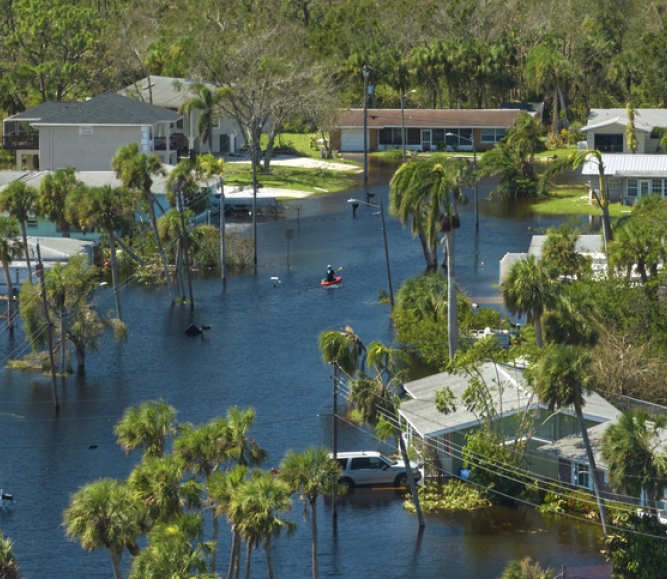Reauthorize the National Flood Insurance Program

Action Needed
Urge your members of Congress to support legislation that will reauthorize the National Flood Insurance Program (NFIP) and ensure the program is accessible and affordable for all county residents. Current authorization ends on March 14, 2025.
Background
The NFIP was created by Congress under the National Flood Insurance Act of 1968 (P.L. 90- 448) to provide insurance coverage to property owners for damages and losses due to catastrophic flooding.
Today, the NFIP is administered by the U.S. Department of Homeland Security (DHS) through the Federal Emergency Management Agency (FEMA). The program aims to reduce the impact of flooding on private and public structures by providing affordable insurance to property owners, and by encouraging communities to adopt and enforce floodplain management regulations.
The NFIP was last reauthorized in 2012 when President Obama signed the Biggert-Waters Flood Insurance Reform Act of 2012 (P.L. 112-141). The NFIP’s five-year reauthorization ended on September 30, 2017, and since then, the program has been funded by a series of short-term measures. The program is currently operating under an extension that will expire on March 14, 2025.
The purpose of the 2012 Biggert-Waters Act was to make the NFIP solvent, as the program faced a $20 billion deficit. However, the law resulted in some unintended consequences for local governments, residents and businesses: multiple counties, both coastal and inland, reported that homeowners and businesses experienced dramatic increases in annual NFIP flood insurance premiums due to phase-outs of subsidized premium rates. Additionally, due to a provision contained in the Biggert-Waters Act, FEMA began to update Flood Insurance Rate Maps (FIRMs), which included new low-lying areas that also began to face drastic rate increases.
In 2014, with NACo’s support, Congress passed the Homeowner Flood Insurance Affordability Act (P.L. 113- 89), which included several key reforms to the Biggert-Waters Act favorable to counties, including grandfathering of premiums for properties built to code prior to the release of the updated Flood Insurance Rate Maps (FIRMs); retroactive refunds to NFIP policyholders if they paid a higher premium under Biggert-Waters; and the removal of a sales trigger that fully actualized premium rates at the point of sale for properties that were added to new flood zones.
In the 118th Congress, NACo supported the National Flood Insurance Program Reauthorization (NFIP-RE) Act of 2023 (S.2142/H.R. 4349) which would cap annual premium increases, incorporate affordability provisions for low- and middle-income policyholders, increase investments in flood mitigation and heighten transparency on FEMA’s new risk rating system. Congress should reintroduce and pass this legislation during the 119th Congress.
Key Talking Points
- Congress should enact a long-term reauthorization of the NFIP. When the federal government uses short-term funding extensions, counties are often unable to effectively plan and implement a workable budget. The NFIP is currently operating under an extension that will expire on March 14, 2025.
- Congress should reintroduce and pass the National Flood Insurance Program Reauthorization (NFIP-RE) Act in the 119th Congress, which would provide five years of continuous operation and greater stability for policyholders through capped annual premium increases, incorporated affordability provisions, increased investments in flood mitigation and heightened risk rating system transparency.
Advocacy
Bipartisan, bicameral legislation introduced to reauthorize and reform the National Flood Insurance Program


U.S. House reintroduces legislation to address the Medicaid Inmate Exclusion Policy
Two bipartisan bills aimed at addressing the Medicaid Inmate Exclusion Policy (MIEP) were recently reintroduced in the U.S. House of Representatives.

FEMA halts disaster mitigation grant program
On April 4, the Federal Emergency Management Agency (FEMA) announced it will not allocate $750 million this year for the Building Resilient Infrastructure and Communities (BRIC) grant program. According to the press release, FEMA will also stop funding BRIC projects that were previously approved and are still underway.

Counties support youth with a second chance opportunity
A Riverside County, Calif. supervisor took experiences from his former life as a teacher to help create a program that serves students who had gone the juvenile justice system and were looking for a second chance.
